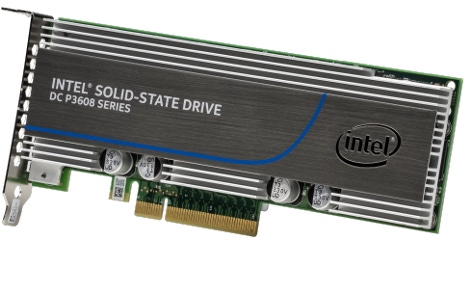Intel Unveils Its Fastest Data Center SSDs YetIntel Unveils Its Fastest Data Center SSDs Yet
P3608 series SSDs engineered specifically for enterprise and HPC workloads
September 29, 2015

Giving a big boost to its Solid State Drive data center family Intel launched the P3608 series SSDs, engineered specifically for enterprise and high-performance computing workloads. The new line transcends the previous Intel generation across many metrics. The P3608 puts two SSDs on a single card and moves data in parallel to achieve higher transfer speeds, albeit at the cost of greater power consumption.
The metric that differentiates the P3608 is it registers transfer speeds over 5 GB/s and up to 850,000 random read IOPS. This is achieved with the help of a NVMe (Non Volatile Memory Express) dual-controller architecture and a move from four lanes to eight lanes of PCIe 3.0. With a dual-controller architecture paired with multi-core Xeon processors, Intel said, the IO can be evenly distributed. Intel notes that this is also more efficient than SATA or SAS, providing more IOPS at a lower CPU utilization. The software RAID-0 load balancing is assisted by a new version of Intel's Rapid Storage Toolkit for Enterprise (RSTe).
The new P3608 family has MLC NAND flash memory and includes capacities of 1.6TB, 3.2TB and 4TB in a low-profile add-in card. The P3608 has a 21.9 Petabytes written endurance rating and 1 million hours mean time before failure for the new SSDs, according to Intel.
Intel's Frank Ober talks about querying very large databases and fast analytics with the new P3608 series, and how it is "fun to run very large TPC-H like queries against this type of drive. To put it in perspective, he said that with "4 x8 cards and 16TB, you'd be able to support over 40TB of compressed SQL Server data using the Fast Track Data Warehouse architectures, because of the excellent compression available with this architecture."
Pricing reflects the power delivered for these new cards, yet it is competitive for the HPC, enterprise and big data markets it is targeting. Intel P3608 cards run approximately $2.19 per GB.
About the Author
You May Also Like







